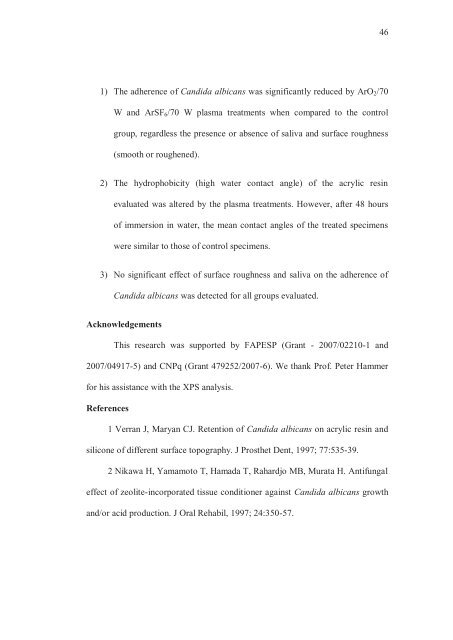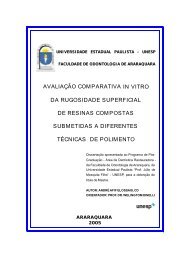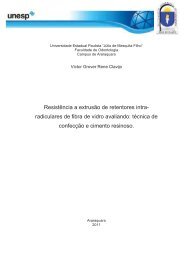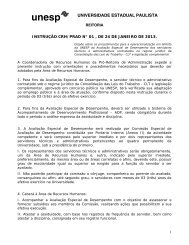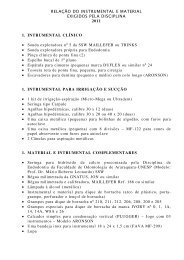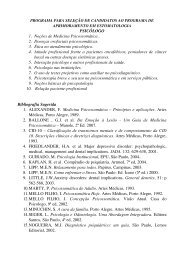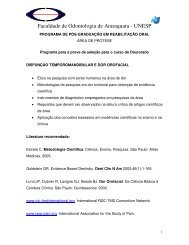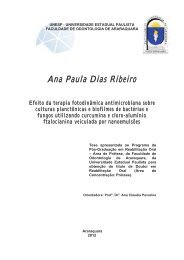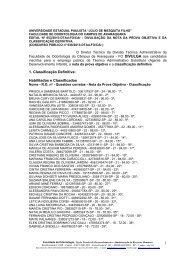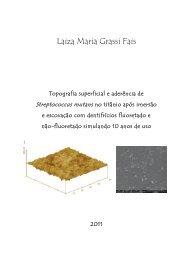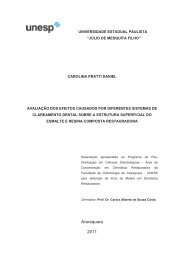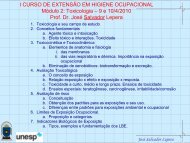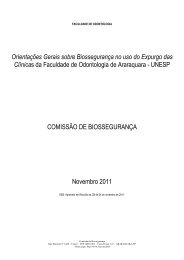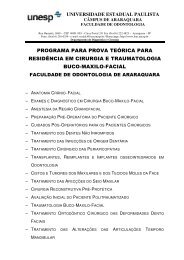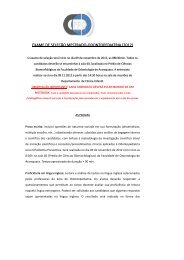- Page 1 and 2: UNIVERSIDADE ESTADUAL PAULISTA “J
- Page 3 and 4: iii Dados Curriculares Camila Andra
- Page 5 and 6: v exemplos, de quem eu me orgulho m
- Page 7 and 8: vii Agradecimentos Especiais Muito
- Page 9 and 10: ix mais novo”! Se eu pudesse, tor
- Page 11 and 12: xi Aos meus amigos de turma do curs
- Page 13 and 14: xiii À Capes (Coordenação de Ape
- Page 15 and 16: Sumário Resumo....................
- Page 17 and 18: ii alterações significantes nos v
- Page 19: ii adherence of Candida albicans, e
- Page 22 and 23: 21 como: não eliminação do micro
- Page 24 and 25: 23 mais hidrofóbica a superfície,
- Page 26: 25 2008), resultando em uma superf
- Page 30 and 31: 3 Capítulos 3.1 Capítulo 1 Adhere
- Page 32 and 33: 31 Introduction The inability of cu
- Page 34 and 35: 33 negatively charged surfaces 22 .
- Page 36 and 37: 35 Plasma Treatments After roughnes
- Page 38 and 39: 37 measurements were performed in a
- Page 40 and 41: 39 was prepared in acetone at 0.4 m
- Page 42 and 43: 41 forces, the development of the m
- Page 44 and 45: 43 adherence observed in the presen
- Page 48 and 49: 47 3 Yildirim MS, Hasanreisoglu U,
- Page 50 and 51: 49 of Thai silk treated by SF 6 pla
- Page 52 and 53: 51 33 Taylor R, Maryan C, Verran J.
- Page 54 and 55: 53 47 Waters MGJ, Williams DW, Jagg
- Page 56 and 57: 55 Table 2 - Means and standard dev
- Page 58 and 59: Figure 2 57
- Page 60 and 61: 3.2 Capítulo 2 Evaluation of funga
- Page 62 and 63: 61 adhering to denture surfaces [1]
- Page 64 and 65: 63 mimicking the tissue-fitting sur
- Page 66 and 67: 65 spectroscopy analysis (XPS), car
- Page 68 and 69: 67 suspension was added to each wel
- Page 70 and 71: 69 Initial adherence of Candida alb
- Page 72 and 73: 71 increase probably occurred by me
- Page 74 and 75: 73 to the adsorption of salivary pr
- Page 76 and 77: 75 3) For all groups evaluated, no
- Page 78 and 79: 77 12. Pereira-Cenci T, Cury AADB,
- Page 80 and 81: 79 25. Ramage G, Tomsett K, Wickes
- Page 82 and 83: 81 38. Nikawa H, Hayashi S, Nikawa
- Page 84 and 85: 83 Tables Table 1 - Means and stand
- Page 86 and 87: 85 Figures Figure 1
- Page 88 and 89: 87 Figure Legends Figure 1 - XPS an
- Page 90 and 91: 89 Abstract Candida adhesion to pol
- Page 92 and 93: 91 to acrylic surfaces of Candida g
- Page 94 and 95: 93 minutes. The denture base acryli
- Page 96 and 97:
95 average was calculated. Specimen
- Page 98 and 99:
97 Statistical Analysis Differences
- Page 100 and 101:
99 the C. glabrata adhesion. The me
- Page 102 and 103:
101 One other important observation
- Page 104 and 105:
103 6. Minagi S, Miyake Y, Inagaki
- Page 106 and 107:
105 19. Nikawa H, Hayashi S, Nikawa
- Page 108 and 109:
107 33. Polukoshko KM, Brudvik JS,
- Page 110 and 111:
109 Tables Table 1 - Means and stan
- Page 112 and 113:
111 5.0 Log (cel/mm2) 4.0 3.0 2.0 *
- Page 114 and 115:
3.4 Capítulo 4 Effect of different
- Page 116 and 117:
115 Introduction The presence of Ca
- Page 118 and 119:
117 Italy) measuring 13.8 X 2 mm we
- Page 120 and 121:
119 4 - 6 ºC during the experiment
- Page 122 and 123:
121 Candida adhesion to dentures, a
- Page 124 and 125:
123 absorbance values obtained afte
- Page 126 and 127:
125 1. Silva WJ, Seneviratne J, Par
- Page 128 and 129:
127 14. Karaagaclioglu L, Can G, Yi
- Page 130 and 131:
129 28. Hahnel S, Rosentritt M, Han
- Page 132 and 133:
131 Tables Table 1 Table 1 - Median
- Page 134 and 135:
3.5 Capítulo 5 The effect of human
- Page 136 and 137:
135 Introduction An important step
- Page 138 and 139:
137 albicans adhesion to a denture
- Page 140 and 141:
139 For group G 3 , whole human uns
- Page 142 and 143:
141 each specimen, using a light mi
- Page 144 and 145:
143 was collected from one donor or
- Page 146 and 147:
145 In conclusion, this study focus
- Page 148 and 149:
147 11. Edgerton M, Scannapieco FA,
- Page 150 and 151:
149 24. Thein ZM, Samaranayake YH,
- Page 152 and 153:
151 37. Zamperini CA, Machado AL, V
- Page 154 and 155:
153 Figures Figure 1 *
- Page 156:
155 Figure Legends Figure 1. Mean a
- Page 159 and 160:
158 significantemente menores quand
- Page 161 and 162:
160 diminuindo os valores de ângul
- Page 163 and 164:
162 Nos estudos apresentados nos ca
- Page 165 and 166:
164 pela coloração cristal violet
- Page 167 and 168:
166 Diferentemente dos resultados o
- Page 170:
5 Conclusão Dentro das limitaçõe
- Page 173 and 174:
172 6. Bürgers R, Hahnel S, Reiche
- Page 175 and 176:
174 22. Hodak SK, Supasai T, Paosaw
- Page 177 and 178:
176 40. Nikawa H, Chen J, Hamada T,
- Page 179 and 180:
178 56. Pusateri CR, Monaco EA, Edg
- Page 181 and 182:
180 73. Tari BF, Nalbant D, Al DF,
- Page 184 and 185:
7 Anexos Anexo 1
- Page 186 and 187:
Anexo 3
- Page 188 and 189:
Anexo 5
- Page 190 and 191:
Anexo 7
- Page 193 and 194:
8 Apêndice Apêndice 1 Os resultad
- Page 195 and 196:
194 Tabela 3A - Grupo submetido ao
- Page 197 and 198:
196 Tabela 5A - Grupo submetido ao
- Page 199 and 200:
198 Tabela 7A - Grupo submetido ao
- Page 201 and 202:
200 Tabela 9A - Grupo submetido ao
- Page 203 and 204:
Apêndice 2 Os resultados obtidos d
- Page 205 and 206:
204 Tabela 13A - Grupo submetido ao
- Page 207 and 208:
206 Tabela 15A - Grupo submetido ao
- Page 209 and 210:
208 Tabela 17A - Grupo submetido ao
- Page 211 and 212:
210 Tabela 19A - Grupo submetido ao
- Page 213 and 214:
Apêndice 3 Os resultados obtidos d
- Page 215 and 216:
214 Tabela 24A - Grupo submetido ao
- Page 217 and 218:
Apêndice 4 Os resultados obtidos d
- Page 219 and 220:
218 Tabela 30A - Grupo submetido ao
- Page 221 and 222:
220 Tabela 34A - Grupo submetido ao
- Page 223 and 224:
Apêndice 5 Os resultados obtidos d
- Page 225 and 226:
224 Os resultados obtidos durante a
- Page 227:
Autorizo a reprodução deste traba


